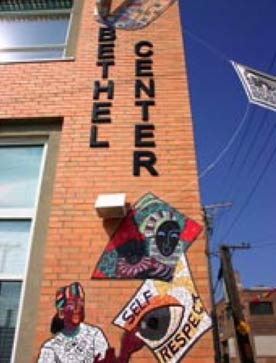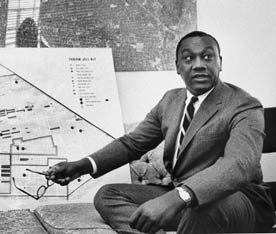Community groups that start from the dirt they stand on and are neither tied to funders nor to institutions are the majority of organizations on the ground prompting real levels of solution building through civic engagement.”
— Colette Pichon-Battle, Moving Forward Gulf Coast, Slidell, La., and Center for Social Inclusion local partner
Colette Pichon-Battle is a 32-year-old lawyer who has been a lifelong activist and social entrepreneur. She has been recognized by the American Bar Association for her work throughout the U.S. Gulf Coast after Hurricane Katrina. After the floods, She was instrumental in organizing and mobilizing several strategic relief and community-development efforts including the Louisiana Network, Inc., Moving Forward Gulf Coast, Inc., and Operation Gulf Coast, a national coalition of private companies, concerned individuals, faith-based and nonprofit organizations. She now works as the Gulf Coast coordinator for Oxfam America. Pichon-Battle symbolizes a new generation of young, black women, who have the energy, vision, skills, and commitment to create a new South, and in essence, a new country.
As staffers with the Center for Social Inclusion (CSI), we met Pichon-Battle and a host of other inspiring community leaders from the South after Hurricanes Katrina and Wilma and have been working with them since. CSI’s goal, as a national organization that partners with local communities, is to support and strengthen community capacity in the Gulf Coast region by supporting leaders like Pichon-Battle as well as informal/organic leaders through policy ideas and research, leadership and network development, and through advocacy strategies for systemic change.
Stories and voices like Pichon-Battle’s emerged in our year-long research project that looked at nonprofit, associational, and informal leadership capacity in five Gulf Coast states (Louisiana, Mississippi, Alabama, Arkansas, and Georgia). CSI staff and five local consultants interviewed more than 80 nonprofit and community leaders as well as local and national funders. As we witnessed the amazing work done by local people with minimal or nonexistent resources, we realized that no one — neither national and local organizations nor funders — had a realistic, comprehensive picture of the state of community infrastructure in the region. Nor did any of them know what kind of investments and support was needed to remove systemic barriers to opportunity for people of color and other marginalized populations. Without that dynamic community capacity, the robust civic engagement needed to successfully rebuilding the region is unlikely to develop.
Because the CSI seeks to support and build local capacity, the participation of community leaders engaged in community development and social justice was central to the project. We based our research on the assumption that local leaders who engage in effective community-building efforts are often not organizationally connected. The implications are that effective leaders may exist in the absence of organizational infrastructure and, therefore, the project had to search for those leaders, and that measuring effective community-building should factor in the role that organizations play in the development of leaders who live and work outside of organizational structures.
We saw the project as a mechanism for testing out the types of relationships that could be built between national intermediaries and local leaders, and between local leaders. Overall, it helped our local partners develop a more complete and nuanced picture of the states in which they work and the actors within it, as well as identify and create opportunities for regional collaboration.
“If you don’t know where you’re coming from, you don’t know where you’re going.”
— Cassandra Welchin, director of policy at the Mississippi Youth Justice Project, Jackson, Miss., and Center for Social Inclusion local partner.
A native Mississippian now living in Jackson, Cassandra Welchin brought her leadership experience and advocacy insights to the project as a local partner. She recently worked as a legislative advocate at Congregations for Children, where she develops legislative and lobbying strategies and tracks legislative and policy proposals that impact poor children in Mississippi. Welchin has consulted for the Southern Rural Black Women’s Initiative (SRBWI), where she provided programmatic support. She has also consulted with Oxfam America, specifically working on the strategic planning for the Mississippi NAACP during their Gulf Coast Reconstruction efforts. She has also worked at Southern Echo, a well-respected community organization, where she developed fundraising plans to build capacity for black-led, black-based, grass-roots organizations in the Mississippi Delta that engage in community-organizing work.
Welchin interviewed the diverse group of leaders — both organic and formal, young and old — for the project. In talking with community elders, she realized the importance of bridging intergenerational gaps by having more intentional conversations with them. She saw these bridge-building conversations as being essential for keeping alive the history of the elders and to overcoming the current struggle to rebuild. Connecting the struggles of the past to the challenges of today also helped both generations to reach a mutually beneficial consensus on rebuilding strategies from recycling to green-building technologies, to making multi-racial alliances for successful community empowerment and participation, to building support networks to advance their agenda of transformative policies and practices.






Comments